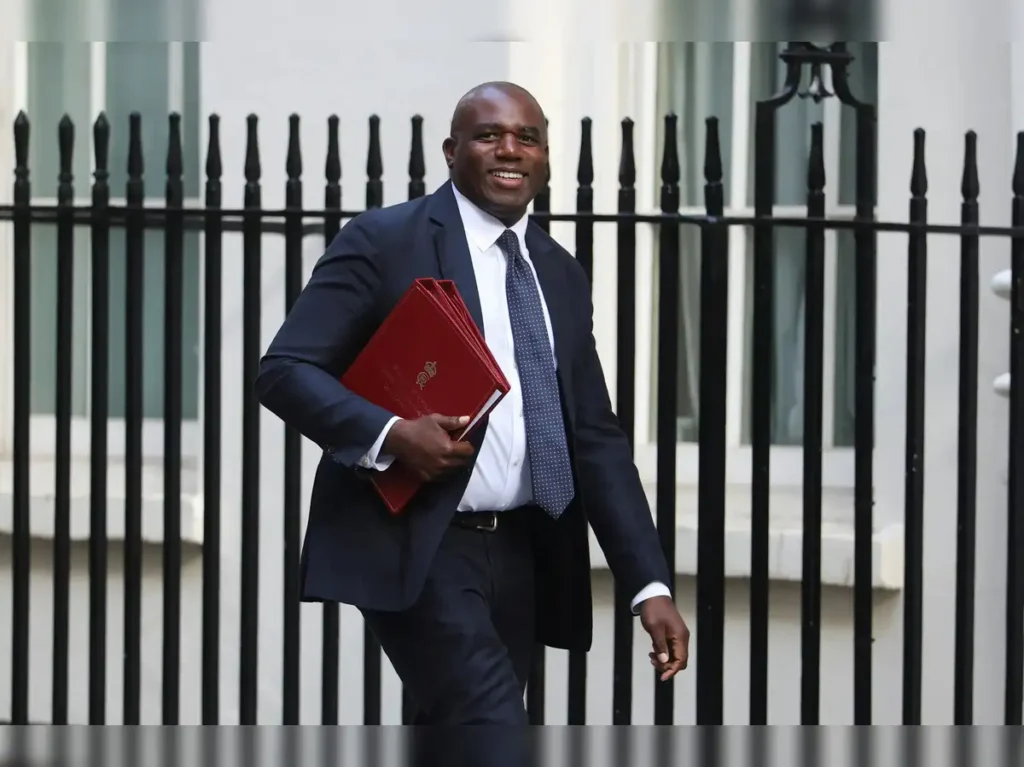David Lammy steps into Westminster’s spotlight as new Deputy Prime Minister. Prime Minister Keir Starmer reshuffles his entire cabinet team. Angela Rayner exits following tax underpayment revelations. This dramatic cabinet reshuffle transforms Britain’s political landscape. Moreover, the changes signal fresh leadership directions. Subsequently, major government departments undergo significant reorganization.

Rayner’s Fall from Grace
Angela Rayner faces her political downfall over stamp duty issues. She underpaid £40,000 on her Hove property purchase. Ethics adviser Sir Laurie Magnus investigates thoroughly. His findings reveal ministerial code breaches. Therefore, resignation becomes inevitable.
The former Deputy Prime Minister admits her mistakes publicly. She purchased an £800,000 flat in East Sussex. Initially, she believed it was her primary residence. However, complex family trust arrangements changed everything. Consequently, she owed higher second-home rates instead.
Furthermore, legal advice proved insufficient for her situation. She consulted three legal professionals initially. None possessed specialized tax expertise apparently. This cabinet reshuffle catalyst exposes advisory gaps. Additionally, HMRC may impose further penalties.
Lammy’s Rise to Power
David Lammy transforms from Foreign Secretary to Deputy PM. Previously, he held various ministerial positions successfully. Tony Blair first appointed him in 2002. Moreover, he studied at Harvard Law School notably. His legal background proves valuable now.
The 53-year-old politician brings extensive experience forward. He served under both Blair and Brown governments. Additionally, his international relations expertise helps. Meanwhile, his close relationship with Starmer continues. Therefore, this promotion seems natural progression.
Lammy also becomes Justice Secretary simultaneously. This dual role enhances his governmental influence. Furthermore, he maintains cabinet seniority effectively. His appointment represents strategic political maneuvering. Subsequently, Labour hopes to stabilize operations.
Cooper’s Foreign Office Journey
Yvette Cooper moves from Home Secretary position. She becomes Britain’s new Foreign Secretary instead. Previously, she focused on immigration policies heavily. Now, international relations become her priority. Therefore, significant portfolio changes occur.
Cooper brings domestic policy experience to diplomacy. She handled asylum and migration issues. Moreover, her economic background proves beneficial. Additionally, she served in previous Labour governments. Consequently, institutional knowledge transfers effectively.
This cabinet reshuffle creates historic precedents too. Three women now hold top positions. Rachel Reeves remains as Chancellor steadily. Therefore, female representation increases significantly. Furthermore, gender balance improves considerably.
Mahmood’s Home Office Challenge
Shabana Mahmood ascends to Home Secretary role. Previously, she served as Justice Secretary successfully. Her legal background supports this transition. Moreover, she faces significant immigration challenges ahead. Therefore, continuity with policy direction continues.
The new Home Secretary inherits complex issues. Illegal migration remains a persistent problem. Additionally, public protests require careful management. Furthermore, community relations need attention constantly. Consequently, her workload increases substantially.
Mahmood represents historic diversity in government. Her appointment signals inclusive leadership values. Moreover, her experience proves valuable immediately. Subsequently, stakeholders expect effective policy implementation. Therefore, performance pressure mounts quickly.
Political Implications and Reactions
Opposition parties criticize this cabinet reshuffle timing. Conservative leader Kemi Badenoch calls it weakness. She claims Starmer lacks decisive leadership. Moreover, Reform UK exploits these developments. Therefore, political pressure intensifies significantly.
Nigel Farage advances his conference speech strategically. He declares the government in crisis. Meanwhile, polling shows Labour trailing Reform. Additionally, public confidence appears shaken currently. Consequently, electoral concerns grow louder.
However, Labour supporters defend these changes. They argue accountability demonstrates strength instead. Moreover, swift action prevents further damage. Additionally, fresh leadership brings new energy. Therefore, optimism remains among core supporters.
Economic Market Response
Financial markets monitor these developments closely. Chancellor Rachel Reeves retains her position. This decision aims to maintain stability. Moreover, investor confidence requires consistent leadership. Therefore, economic policy continuity continues.
However, political uncertainty affects market sentiment. Moreover, frequent changes raise concerns generally. Additionally, international observers watch carefully too. Furthermore, business leaders seek reassurance constantly. Consequently, economic stability becomes paramount priority.
The cabinet reshuffle timing raises questions also. Markets prefer predictable government operations instead. Moreover, constant changes create investment uncertainty. Therefore, economic implications require careful consideration.
Ministerial Code Enforcement
This case tests new ethics systems. Sir Laurie Magnus conducts thorough investigations. His findings demonstrate enhanced accountability measures. Moreover, ministerial standards receive stronger enforcement. Therefore, public trust rebuilding efforts continue.
The investigation reveals important precedents too. Ministers cannot ignore specialized advice recommendations. Moreover, complex financial arrangements require expert guidance. Additionally, family circumstances don’t excuse oversight. Consequently, accountability standards tighten significantly.
Furthermore, the ethics system shows independence. Magnus concludes investigations fairly and transparently. Moreover, his recommendations carry substantial weight. Therefore, ministerial behavior improvements seem likely.
Housing Policy Continuity
Steve Reed assumes housing responsibilities now. He replaces Rayner in this crucial role. Moreover, housing crisis requires urgent attention. Additionally, policy continuity becomes essential immediately. Therefore, smooth transitions matter greatly.
The housing portfolio faces significant challenges ahead. Moreover, affordability issues persist across regions. Additionally, planning reforms need implementation urgently. Furthermore, social housing demands increase constantly. Consequently, effective leadership becomes critically important.
Reed brings environmental policy experience forward. Previously, he handled sustainability issues successfully. Moreover, his local government background helps. Therefore, practical knowledge transfers effectively.
International Relations Impact
Lammy’s departure from Foreign Office creates ripples. His relationship with JD Vance was developing. Moreover, international partnerships require consistent management. Additionally, global challenges demand experienced leadership. Therefore, Cooper must adapt quickly.
The timing affects international negotiations potentially. Moreover, foreign partners expect stability instead. Additionally, key summits approach rapidly ahead. Furthermore, diplomatic relationships need nurturing constantly. Consequently, smooth transitions become essential.
However, Cooper brings fresh perspectives too. Moreover, her domestic policy experience offers insights. Additionally, new approaches might prove beneficial. Therefore, change sometimes creates opportunities instead.
Labour Party Leadership Dynamics
Rayner’s resignation triggers deputy leadership contests. Party members will elect her replacement. Moreover, this process might expose internal divisions. Additionally, different factions may emerge clearly. Therefore, party unity faces testing.
Various candidates will likely emerge soon. Moreover, ideological differences may surface publicly. Additionally, Starmer’s leadership faces indirect challenges. Furthermore, grassroots opinions matter significantly here. Consequently, political maneuvering intensifies quickly.
The contest timing creates additional pressures. Moreover, government operations need stability instead. Additionally, media attention divides focus unnecessarily. Therefore, party management becomes crucially important.
Public Trust and Accountability
This cabinet reshuffle affects public perceptions significantly. Moreover, accountability demonstrates commitment to standards. Additionally, swift action prevents prolonged controversies. Furthermore, transparent processes build confidence gradually. Therefore, trust rebuilding efforts continue.
However, frequent changes raise concerns too. Moreover, stability expectations conflict with accountability. Additionally, public fatigue with political scandals. Furthermore, cynicism about political classes grows. Consequently, careful balance becomes essential.
The government must demonstrate competence now. Moreover, policy delivery matters more than. Additionally, practical results speak louder ultimately. Therefore, performance becomes the ultimate test.
Future Government Stability
Starmer’s leadership faces renewed scrutiny currently. Moreover, this cabinet reshuffle tests his authority. Additionally, further changes might seem necessary. Furthermore, stability requires careful management constantly. Therefore, strategic planning becomes essential.
The new team must prove effectiveness quickly. Moreover, public expectations remain high generally. Additionally, opposition parties seek further vulnerabilities. Furthermore, media attention continues intensely focused. Consequently, pressure mounts on everyone.
However, fresh leadership brings new energy. Moreover, different perspectives might improve policies. Additionally, accountability demonstrates strength ultimately. Therefore, positive outcomes remain entirely possible.
This transformative cabinet reshuffle reshapes British politics fundamentally. David Lammy’s elevation demonstrates strategic thinking. Angela Rayner’s departure shows accountability importance. Meanwhile, government stability requires careful nurturing. Ultimately, performance will determine success.





